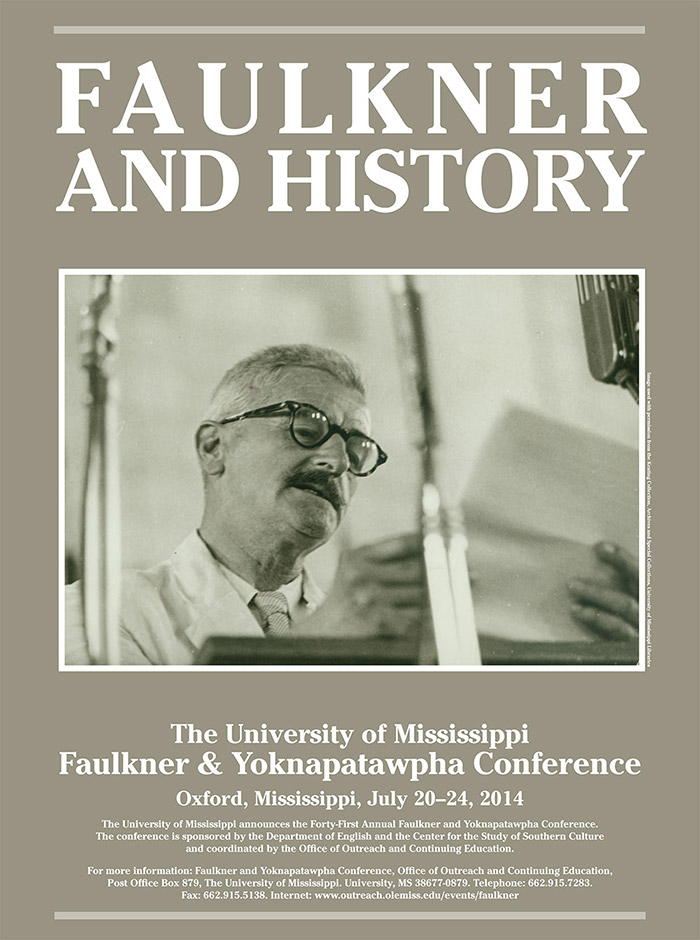
Panel. Histories of Labor and Technology
Location
Nutt Auditorium
Start Date
21-7-2014 9:30 AM
Description
- Unpacking Faulknerian Technology: Cars, History, and the South / Deborah Clarke, Arizona State University
The relationship between history and technology in Faulkner’s work is vexed and inconsistent; this paper will explore how Faulkner positions the history of automobile technology, production, and marketing against Southern history. The technology of automobility creates a South both geographically connected to the rest of the nation and resistant, a South in which the uneasiness surrounding the physical body—grounded in a history which deemed some bodies less human—finds a modern twist in automotive technology. The automobile problematizes Southern identity in a way that acknowledges place, history, diversity, and modernity, a matrix so complex that it takes a Faulkner to begin to unpack it. - Faulkner's Debt / Sean McCann
This paper considers Faulkner’s postwar fiction, focusing especially on A Fable and Requiem for a Nun, to consider the roles that competing concepts of debt, sin, and crime play in the narratives of “civic genesis” (Don Doyle) Faulkner crafted in this stage of his career. This paper will focus in particular on Faulkner’s references to the alleged antebellum criminal mastermind John Murrell in the making of Yoknapatawpha. The paper will argue that Murrell’s role—at once crucial and marginal--illuminates both fundamental contradictions in the historical origins of Faulkner’s world and in the moral drama Faulkner attempted to construct for the mid-twentieth-century United States. In particular, Murrell’s legend highlights the potential conflict between white supremacy and property rights, and the allied languages of morality and legality, in both the founding of Yoknapatawpha and in its postwar transformation. - "A Well-Traveled Mudhole": Nostalgia, Labor, and Laughter in The Reivers / Rebecca B. Clark, University of California, Berkeley
Examining the vexed interactions between labor, laughter, and nostalgia in Faulkner’s final novel, this paper argues for the value of The Reivers as a study in Jim Crow Era engagements with the idea and affect of Southern History. In the novel, nostalgic parable is aerated with moments of cutting social criticism that reveal a keen, if conflicted, historiographic imagination at work. One such moment is the picaresque’s pivotal mudhole scene, which dares readers both to get bogged down in mythic allegory and to skip across the surface of real and uncomfortable subtexts of racial violence. The paper argues that the hazardous physical and interpretive morass this scene offers can be read as Faulkner’s self-conscious figure for the novel’s (and its imagined readers’) own flirtations with nostalgia, and for this affect’s volatile—and potentially violent—interactions with and implications for the text’s otherwise unacknowledged Jim Crow context.
Relational Format
Conference proceeding
Recommended Citation
Clarke, Deborah; McCann, Sean; and Clark, Rebecca B., "Panel. Histories of Labor and Technology" (2014). Faulkner and Yoknapatawpha Conference. 8.
https://egrove.olemiss.edu/fy/2014/schedule/8
COinS
Jul 21st, 9:30 AM
Panel. Histories of Labor and Technology
Nutt Auditorium
- Unpacking Faulknerian Technology: Cars, History, and the South / Deborah Clarke, Arizona State University
The relationship between history and technology in Faulkner’s work is vexed and inconsistent; this paper will explore how Faulkner positions the history of automobile technology, production, and marketing against Southern history. The technology of automobility creates a South both geographically connected to the rest of the nation and resistant, a South in which the uneasiness surrounding the physical body—grounded in a history which deemed some bodies less human—finds a modern twist in automotive technology. The automobile problematizes Southern identity in a way that acknowledges place, history, diversity, and modernity, a matrix so complex that it takes a Faulkner to begin to unpack it. - Faulkner's Debt / Sean McCann
This paper considers Faulkner’s postwar fiction, focusing especially on A Fable and Requiem for a Nun, to consider the roles that competing concepts of debt, sin, and crime play in the narratives of “civic genesis” (Don Doyle) Faulkner crafted in this stage of his career. This paper will focus in particular on Faulkner’s references to the alleged antebellum criminal mastermind John Murrell in the making of Yoknapatawpha. The paper will argue that Murrell’s role—at once crucial and marginal--illuminates both fundamental contradictions in the historical origins of Faulkner’s world and in the moral drama Faulkner attempted to construct for the mid-twentieth-century United States. In particular, Murrell’s legend highlights the potential conflict between white supremacy and property rights, and the allied languages of morality and legality, in both the founding of Yoknapatawpha and in its postwar transformation. - "A Well-Traveled Mudhole": Nostalgia, Labor, and Laughter in The Reivers / Rebecca B. Clark, University of California, Berkeley
Examining the vexed interactions between labor, laughter, and nostalgia in Faulkner’s final novel, this paper argues for the value of The Reivers as a study in Jim Crow Era engagements with the idea and affect of Southern History. In the novel, nostalgic parable is aerated with moments of cutting social criticism that reveal a keen, if conflicted, historiographic imagination at work. One such moment is the picaresque’s pivotal mudhole scene, which dares readers both to get bogged down in mythic allegory and to skip across the surface of real and uncomfortable subtexts of racial violence. The paper argues that the hazardous physical and interpretive morass this scene offers can be read as Faulkner’s self-conscious figure for the novel’s (and its imagined readers’) own flirtations with nostalgia, and for this affect’s volatile—and potentially violent—interactions with and implications for the text’s otherwise unacknowledged Jim Crow context.

